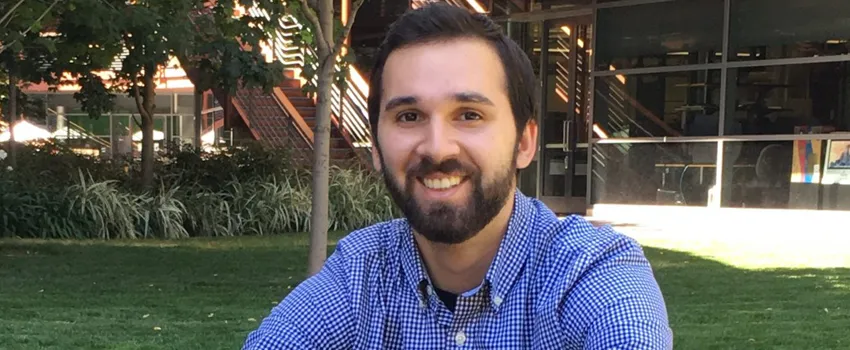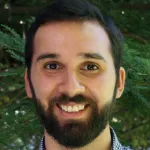
Photo by Alyssa Tamboura.
Stanford Medicine Scope - August 31st, 2017 - by Vivian Lam
A native of Southern California, Amin Aalipour is a MD-PhD student who also earned his undergraduate degree at Stanford. He's interested in fighting diseases by developing early detection techniques and is working in the lab of Sanjiv "Sam" Gambhir, MD, PhD, where he is a Bio-X graduate student fellow. I caught up with him to learn more.
Why did you want to go into science and medicine?
I think one of the beauties of science and medicine is that your purpose is staring right at you. Every time you interact with a patient, there’s your purpose right in front of you. When you’re working on something in the lab and you have hopes that one day this is going to help someone with cancer, there’s your motivation to keep on fighting.
The second part of that would be personality and culture fit. I value humanism, but also diligence and meticulousness. Science and medicine are fields that really reward these personality traits and I feel like I get along well with my colleagues since we share these values.
What are you working on today?
I’m figuring out how can we amplify rare signals. Early cancer detection is all about detecting very rare signs of disease, ideally in the blood, urine, stool, or breath... If we can detect them at low levels, it can potentially be a powerful tool to detect and treat these patients earlier and ultimately achieve better outcomes.
What are your career plans?
The dream would be to spend time in the clinic as an oncologist while also developing new cancer diagnostic strategies in my own lab. I hope to work in an academic setting but also translate new technologies beyond the proof-of-principle stage and into viable products.
How do you unwind?
I listen to a lot of music -- mostly underground rap with social or political commentary and classical Persian music. I also play a considerate amount of basketball.
What was the best trip you’ve taken and why?
The most meaningful trips I’ve had were trips to Iran growing up. I remember the last time sitting in the airport on the way back to the U.S. and just crying my eyes out because I had never felt so much at home like the way I did in Iran. I was raised here, but so much of my identity is with the Iranian culture.
What do your colleagues not know about you?
I think most of my colleagues are aware that I am Muslim, but they do not know the role that my faith plays in my day-to-day life. I don’t really talk about being Muslim to a lot of people. For me, it’s really personal. My faith guides not just the ritualistic things I do like pray throughout the day, but it also guides my bigger goals in life. The motivation to be the best clinician and scientist I can be is not about personal accolade. It’s all about trying my best to not waste any potential I've been fortunate enough to have been given while also being a model for what a Muslim American is capable of doing in the U.S. That second point is probably more important in the current political climate than at any other time.
Do you have a role model?
I have scientific role models, such as Robert Langer, Sc.D., at MIT, but in terms of wanting to live a life of service, my role models are my parents. They are immigrants and I admire the sacrifices they made, both in terms of comfort and financially, for my brothers and me to have the opportunities to do things they were not able to do. With science and medicine, I hope to do my part to give back and make good on their investment.

